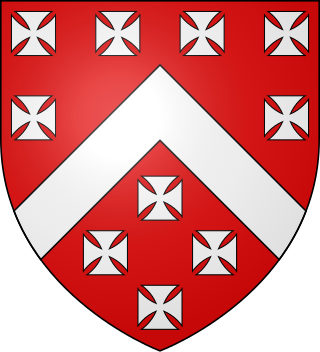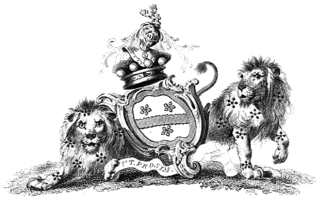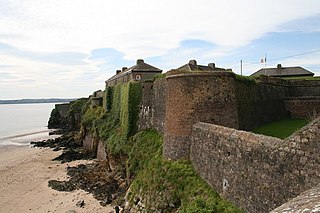Related Research Articles

The Lord Steward or Lord Steward of the Household is an official of the Royal Household in England. He is always a peer. Until 1924, he was always a member of the Government. Until 1782, the office was one of considerable political importance and carried Cabinet rank.

The barony of Camoys was created twice. From 26 November 1313 to 1 April 1335 Ralph de Camoys (d.1336) was summoned to Parliament by writ, and is thereby held to have become Baron Camoys of the first creation. Ralph de Camoys (d.1336) married firstly, Margaret de Brewes, daughter of William de Brewes, 1st Lord Brewes (d.1291), and secondly, Elizabeth le Despenser, daughter of Hugh le Despenser, 1st Earl of Winchester.

The title Baron Berkeley originated as a feudal title and was subsequently created twice in the Peerage of England by writ. It was first granted by writ to Thomas de Berkeley, 1st Baron Berkeley (1245–1321), 6th feudal Baron Berkeley, in 1295, but the title of that creation became extinct at the death of his great-great-grandson, the fifth Baron by writ, when no male heirs to the barony by writ remained, although the feudal barony continued. The next creation by writ was in 1421, for the last baron's nephew and heir James Berkeley. His son and successor William was created Viscount Berkeley in 1481, Earl of Nottingham in 1483, and Marquess of Berkeley in 1488. He had no surviving male issue, so the Marquessate and his other non-inherited titles became extinct on his death in 1491, whilst the barony passed de jure to his younger brother Maurice. However, William had disinherited Maurice because he considered him to have brought shame on the noble House of Berkeley by marrying beneath his status to Isabel, daughter of Philip Mead of Wraxhall, an Alderman and Mayor of Bristol. Instead, he bequeathed the castle, lands and lordships comprising the Barony of Berkeley to King Henry VII and his heirs male, failing which to descend to William's own rightful heirs. Thus on the death of King Edward VI in 1553, Henry VII's unmarried grandson, the Berkeley inheritance returned to the family. Therefore, Maurice and his descendants from 1492 to 1553 were de jure barons only, until the return of the title to the senior heir Henry, becoming de facto 7th Baron in 1553. Upon his death he was succeeded by his relative George Harding.
Baron Cromwell is a title that has been created several times in the Peerage of England. The first creation, which was by writ, was for John de Cromwell in 1308. On his death, the barony became extinct. The second creation came in 1375 when Ralph de Cromwell was summoned by writ to Parliament as Lord Cromwell. His grandson, the third baron, served as Lord High Treasurer to King Henry VI. However, on his death in 1455, the barony fell into abeyance between his nieces Maude and Joan. On Joan's death in 1490, the abeyance was terminated in favour of Maude, the fourth holder. When she died childless in 1497 the peerage once again fell into abeyance, this time between the daughters of the first baron. The title remained in abeyance for over 400 years. However, in 1922 the Committee for Privileges of the House of Lords reported in favour of the petition for the termination of the abeyancy of Selina Frances Bewicke-Copley. She was the daughter of Sir Charles Watson Copley, 3rd Baronet, and one of the co-heirs of Maud, daughter of the first baron Cromwell. Selina died in 1923 and in July of the same year, the abeyance was terminated in favour of her son Robert Godfrey Wolesley Bewicke-Copley, who became the fifth baron. He notably served as Lord Lieutenant of Leicestershire. As of 2010 the ancient barony is held by his grandson, the seventh baron, who succeeded his father in 1982. Having lost his seat in the House of Lords under the House of Lords Act 1999, in April 2014 he was elected at a hereditary peers' by-election as a Crossbencher.

Viscount Falmouth is a title that has been created twice, first in the Peerage of England, and then in the Peerage of Great Britain. The first creation came in the Peerage of England in 1674 for George FitzRoy, an illegitimate son of King Charles II by Barbara Villiers. He was created Earl of Northumberland at the same time and in 1683 he was made Duke of Northumberland. However, he left no heirs, so the titles became extinct at his death in 1716.

Baron Foley is a title that has been created twice in the Peerage of Great Britain, both times for members of the same family.

Baron Rodney, of Rodney Stoke in the County of Somerset, is a title in the Peerage of Great Britain. It was created in 1782 for the naval commander Sir George Brydges Rodney, 1st Baronet. He had previously been created a Baronet, of Alresford in the County of Southampton, in the Baronetage of Great Britain on 22 January 1764. His son, the second Baron, represented Northampton in Parliament. He was succeeded by his eldest son, the third Baron. He served as Lord Lieutenant of Radnorshire. His younger brother, the fourth Baron, assumed by Royal licence the additional surname of Harley in 1804. On his death the titles passed to his younger brother, the fifth Baron. He was Rector of Elmley in Kent. He was succeeded by his nephew, the sixth Baron. He was the son of Captain the Hon. Robert Rodney, fourth son of the second Baron. The sixth Baron's great-grandson, the ninth Baron, was an active member of the House of Lords and served as a Delegate to the Council of Europe and the Western European Union. As of 2011 the titles are held by the latter's grandson, the eleventh Baron, who succeeded in 2011.

Baron Harris, of Seringapatam and Mysore in the East Indies and of Belmont in the County of Kent, is a title in the Peerage of the United Kingdom.

Baron Ashburton, of Ashburton in the County of Devon, is a title that has been created twice, once in the Peerage of Great Britain and once in the Peerage of the United Kingdom. Since 1835, the title has been held by members of the Baring family.
Baron Bruntisfield, of Boroughmuir in the City of Edinburgh, is a title in the Peerage of the United Kingdom. It was created in 1942 for the Scottish Conservative politician and former Vice-Chamberlain of the Household, Sir Victor Warrender, 8th Baronet. The Warrender family descends from George Warrender. He was Lord Provost of Edinburgh and represented Edinburgh in Parliament. In 1715 he was created a baronet, of Lochend in the County of Haddington, in the Baronetage of Great Britain. His grandson, the third Baronet, fought at the Battle of Minden in 1759, represented Haddington Burghs in the House of Commons and served as King's Remembrancer of the Court of Exchequer from 1771 to 1791. He was succeeded by his son, the fourth Baronet. He sat as a Member of Parliament for Haddington Burghs, Truro, Sandwich, Westbury and Honiton and notably served as a Lord of the Admiralty from 1812 to 1812. In 1822 Warrender was admitted to the Privy Council. On his death the title passed to his younger brother, the fifth Baronet. His grandson, the seventh Baronet, was a Vice Admiral in the Royal Navy. He was succeeded by his son, the eighth Baronet, who was raised to the peerage as Baron Bruntisfield, of Boroughmuir in the City of Edinburgh, in 1942. As of 2010 the titles are held by the latter's grandson, the third Baron, who succeeded in 2007. He is a retired officer in the British Army and investment banker.

Baron Greystoke is a title that has been created twice in the Peerage of England. It was first created when John de Greystok was summoned to Parliament in 1295.
The Master of the Buckhounds was an officer in the Master of the Horse's department of the British Royal Household. The holder was also His/Her Majesty's Representative at Ascot. The role was to oversee a hunting pack; a buckhound is smaller than a staghound and used for coursing the smaller breeds of deer, especially fallow deer. The position was abolished by the Civil List Act 1901.
Sir Henry Lingen, Lord of Sutton, Lingen and Stoke Edith, was a Royalist military commander in Herefordshire during the English Civil War, and later a member of parliament. He was the son of Edward Lingen and Blanche Bodenham. He fathered 2 sons, Henry and William and 7 daughters, Elizabeth, Joan, Blanch, Mary (Dobbyns), Cecilia, Frances (Unett), and Alice (Herring). Both sons died without issue but the daughters left considerable posterity.

Pravda is a satirical play by David Hare and Howard Brenton exploring the role of journalism in society. It was first produced at the National Theatre in London on 2 May 1985, directed by Hare and starring Anthony Hopkins in the role of Lambert Le Roux, white South African media mogul. Labelled a "Fleet Street comedy", it is a satire on the mid-1980s British newspaper industry during the Thatcher era, in particular the Australian press baron Rupert Murdoch. Its title refers to the Russian Communist party newspaper Pravda.

Nathaniel Curzon, 2nd Baron Scarsdale was an English Tory politician and peer.

General The Rt Hon. Ralph Gore, 1st Earl of Ross, known as Sir Ralph Gore, 6th Baronet, from 1746 until 1764, subsequently as The Baron Gore until 1768, and then as The Viscount Belleisle until 1772, was an Anglo-Irish soldier, politician and peer.

The Governor of Duncannon Fort was a military officer who commanded the garrison at Duncannon in County Wexford. In later years the post became a sinecure and was abolished on the death of the last holder in 1835.
The 1885 Dissolution Honours List was issued in June 1885 prior to the general election of that year.